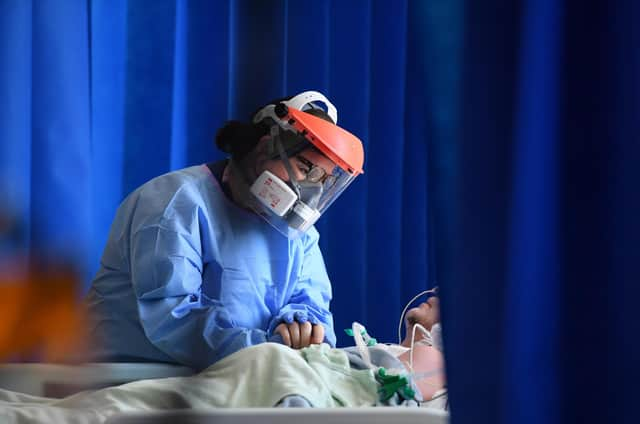As Covid pandemic continues, NHS patients may slip through cracks of fractured health service unless staff burnout is addressed – Professor Jackie Taylor


Over time, the world has become gradually desensitised to reports of suffering and stories of tragedy.
The reality is, that whilst society is inertly accepting of this, those who work at the coalface of our healthcare sector are reaching burnout. We are concerned that patients may slip through the cracks of a fractured system being held together by the heroic efforts of those who, themselves, need our help. Put simply, we do not have the physical or workforce capacity to meet the current levels of demand for patient care.
Advertisement
Hide AdAdvertisement
Hide AdWe need to act now if we are to protect the future of our workforce for everyone’s benefit.
So how do we move forward? With pace, collaboration, and consistency. There is no quick fix, but by starting now, with a clear strategic vision of both the shape of health and social care services and the skills needed to deliver them we have the best opportunity to provide optimum healthcare for the future.
As an organisation, we have carried out research to understand the challenges faced by those working in healthcare. Staff shortages and excessive workloads are nothing new; Covid-19 has simply placed additional unrelenting pressure on a buckling workforce. Our ambition is to establish meaningful and achievable solutions to respond to these core imbalances to deliver a ‘healthier’ health service.
Over the course of the pandemic, the Scottish government has produced resources and support for staff with a focused attention on well-being. The introduction of the National Well-being Hub, the Workforce Well-being Champions Network and the Workforce Specialist Service have provided much needed support for an area that had previously been overlooked.
With further investment in staff well-being and support detailed in the NHS Scotland Recovery Plan for 2021 to 2026 and also the winter plan for this year, the commitments are widely welcomed within the profession.
Efforts to fundamentally address well-being concerns must be prioritised. In Scotland, more than one in five consultants are leaving NHS roles in their mid-to-late 50s. Disillusionment with the job, struggles with work/life balance and impact on personal health and well-being have all been stated as reasons for early retirement.
Chronic excessive workload is the primary reason behind poor well-being. Physical and psychological ill-health within the profession is responsible for one third of doctors feeling burned out to a high or very high degree.
I believe there are three interlinked areas in which recommendations should be made, comprising planning, supply, and retention. Match this with an honest approach to collaboration and the path should become easier to navigate.
Advertisement
Hide AdAdvertisement
Hide AdThere are number of ways we can utilise what is already in place to support progress. One is to consider where we can utilise transferable competencies and knowledge for trainees who could work between specialities. The opportunity to upskill healthcare professionals is also key as we seek to build capacity, improve workforce retention, and make the most of expertise within the sector.
Over the last decade, we’ve seen the number of foundation-level doctors who progress directly into speciality training drop dramatically from close to 90 per cent in 2010 to just 35 per cent. Research indicates that this choice is driven by a perceived lack of flexibility, alongside a belief that non-training posts offer a better work-life balance. When looking ahead, we need to understand more about the dramatic shift in these figures and provide solutions to decrease them.
If we are to support the well-being needs of our workforce more effectively, we need to encourage a move towards a system which accommodates flexible and part-time working. Current figures show that 42 per cent of female consultants – compared to just 12 per cent of males – are more likely to work less than full time. Long gone is the image of the traditional household and if we are to benefit from the skills offered by a growing female headcount, we must cater to their needs.
In making these changes, I believe we will address some of the issues around staff retention and support future recruitment drives. While flexible working policies must be considered carefully, the ongoing need to fill current vacancies and alleviate excessive workloads to meet the demand for services cannot be overlooked.
Finally, the commitment from government to increase the number of medical school places for Scottish students and increasing access for people from different backgrounds is a further piece of the jigsaw.
We must ensure that international recruitment is ethical and ensures medical graduates from around the world are welcomed and supported appropriately. Widening access into the medical profession and ensuring equality, diversity, and inclusion are key drivers in bringing a workforce of the future to an attractive workplace.
Developing and retaining the workforce of the future requires vision, creativity, and strategy. It also requires the creation of a culture which truly values staff, which listens to them, responds, and leads compassionately.
This is a complex area, yet some of the solutions are simple and must be enacted if we are to achieve the necessary sustained programme of change which will help bring Scotland’s healthcare sector into the 21st century.
Advertisement
Hide AdAdvertisement
Hide AdIt's not a fast fix but neither is rocket-science and there can be no doubt that after the efforts shown over the last 18 months, we absolutely owe it to our workforce.
Professor Jackie Taylor is president of the Royal College of Physicians and Surgeons of Glasgow
A message from the Editor:
Thank you for reading this article. We're more reliant on your support than ever as the shift in consumer habits brought about by coronavirus impacts our advertisers.
If you haven't already, please consider supporting our trusted, fact-checked journalism by taking out a digital subscription.
Comments
Want to join the conversation? Please or to comment on this article.
